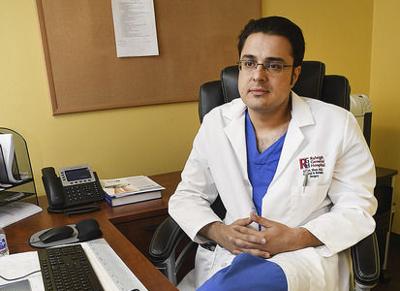After completing his training in bariatric surgery at University Hospitals' Cleveland Medical Center in 2017, Dr. Adil Khan knew he wanted to go somewhere he could make a difference.
For the last two years, the State of Obesity report has ranked West Virginia at the top of the national chart for its adult obesity rates — with 37.7 percent of adults classifying as obese in 2016, and 38.1 percent in 2017.
With the exception of two years, obesity rates have increased every year in the Mountain State since 1990, when the State of Obesity began collecting data. The two years West Virginia saw a decline, in 2004 and 2015, the decrease was only by half a percentage point.
With those numbers in mind, the choice was easy.
"With West Virginia No. 1 in obesity, what better place to go to help the community?" Khan said.
West Virginia is not alone with its weight struggles — in 2017, every state in the nation had an adult obesity rate of 22 percent or higher.
As the country has struggled with growing waistlines, especially in the last 20 years, surgical weight loss options have become more and more popular.
Until now, southern West Virginians have had to travel, at least to Charleston, for bariatric surgery.
But with the addition of Dr. Khan, Raleigh General Hospital is offering the sleeve gastrectomy procedure, and will soon offer gastric bypass.
• • •
When sharing information about bariatric surgery, Khan talks with a lightness.
He knows weight loss surgery is a serious procedure, a measure to only be taken as a last resort.
But he says he knows the difference it can make in the lives of his patients.
"Obesity is a disease that affects all organs," Khan said, "everything from your nervous system, heart, respiratory system, joints and GI tract."
The National Institutes of Health (NIH) reports a number of health problems associated with obesity, including type 2 diabetes, high blood pressure, heart disease and strokes, certain types of cancer, sleep apnea, osteoarthritis, fatty liver disease and kidney disease.
As his patients lose weight, Khan says they oftentimes lose the associated health problems, too.
"Their energy is improved, their joints feel better," he said. "It's exciting to see the change in their overall health."
Not only can weight loss surgery help patients lose a significant amount of weight, Khan said, but it can also help them keep it off for a long time.
According to the American Society for Metabolic and Bariatric Surgery (ASMBS), as many as 50 percent of patients may regain a small amount of weight two years or more following their surgery. However, ASMBS reports longitudinal studies find that most bariatric surgery patients maintain successful weight-loss long-term.
The ASMBS said "successful" weight loss is defined as weight-loss equal to or greater than 50 percent of excess body weight. But for many patients, success is determined by an improved quality of life.
Improving a patient's quality of life is what makes Dr. Khan so passionate about his work.
"That's the reason I came into weight loss surgery — the immediate affect on health and lifestyle."
He's seen patients end their battle with depression and decrease their need for diabetes medications.
"The feedback is amazing."
• • •
For the sleeve procedure, Khan explains that the stomach is taken from the size of a football to the size of a banana.
"It limits the amount of food you can intake," he said, which makes the patient feel full sooner.
This procedure may affect hormones impacting appetite and metabolism, which also promotes weight loss.
For gastric bypass, the majority of the stomach is disconnected and reconnected to the bowel, allowing only an ounce of food to be ingested at a time.
Food bypasses most of the stomach and the upper part of the small intestine so the body absorbs fewer calories.
This surgery, too, makes the stomach smaller, so patients eat less and feel full sooner, and can also affect hormones associated with appetite and metabolism.
Both of these options, Khan said, are supported by insurance. Other nonsurgical options, such as endoscopic and balloon procedures, are available, but are not currently covered by insurance.
Recovery for both the sleeve and gastric bypass is between 24 to 48 hours. Heavy lifting is discouraged for both procedures for six weeks following surgery.
Co-morbidities are an important factor in choosing which surgical option is best, Khan explained. For example, gastric bypass is a better option for people with uncontrolled diabetes or reflux issues.
• • •
Khan emphasizes the surgical options aren't "magic" — they still take time, effort and dedication to making lifestyle changes.
"The most important thing to know is that surgery is a tool," he said. "You have to be committed to a lifelong change with diet and exercise."
Khan's weight loss clinics have been up and running since November, and three patients have been approved for surgeries, which should take place in the coming weeks.
To be a candidate for weight loss surgery, the National Institutes of Health (NIH) recommends patients either have a BMI (body mass index) of 35 with co-morbidities such as diabetes or heart disease, or have a BMI of 40 or greater.
"We look inside of the stomach through an endoscopic procedure to make sure everything is OK," Khan said. "We also have to get them ready with nutritional support."
Nutritionists offer dietary and weight loss recommendations to the patients to kickstart their weight loss and begin making lifestyle changes.
Before surgery, patients are required to undergo three to six months of medical weight loss to ensure their commitment — this is both a physician recommendation and an insurance company requirement.
Patients also have to undergo a psychiatric evaluation to identify any underlying mental health issues or possible eating disorders.
• • •
Anyone who would like to learn more is invited to attend a seminar April 20 at noon at the Raleigh General Hospital Education Center, behind the hospital.
The free seminar will be held once a month for patients to learn more about their options. Attendees will be encouraged to take a questionnaire and fill it out at home to help determine whether surgery is right for them.
"This is the first time we're doing a comprehensive weight loss program," Khan said. "We have a goal of becoming a center of excellence. Everyone from management to the OR team is working hard to make sure we become a center of excellence."
Dr. Khan's office is at 2962 Robert C. Byrd Drive in Beckley.
For more information, call 681-207-7563.
Email: wholdren@register-herald.com and follow on Twitter @WendyHoldren


















Commented
Sorry, there are no recent results for popular commented articles.